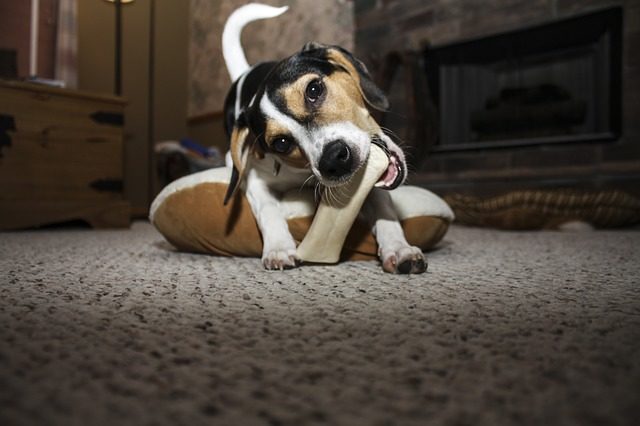Around two to four months old is probably the period when you notice that your puppies are drooling and chewing on everything.
That’s a signal that they are teething. Just like babies, puppies will fuss a lot and may eat very cautiously, as their gums are very sore, at this stage.
When puppies are teething, they love to chew on anything and everything.
They will chew on whatever crosses their path; shoes, clothes, furniture…. You name it…they will chew on it.
They will even playfully nibble at you and your kids. Pups will also bite sometimes, to get your attention or when they want to play.
It is nothing to worry about, as most puppies eventually grow out of it.
Sadly, it might be after you are a few shoes and clothes short – that’s if you continue leaving those things lying around.
A few years ago, when our dogs Ky and Po were a few months old and had began teething, they literally chewed their bed and beddings to pieces, as we watched helplessly.
Consequently, they and their mom, Scooby, had to sleep on the floor for several weeks before I was able to get them a “bite-free” dog house.
As you can imagine, this led to a lot of frustration on our part… and got me to thinking – could this have been avoided?
Is there a way to prevent your little pups from destroying everything they get their cute little paws on?
Here are some tips that will hopefully work for you in training your pup during this period:
Safe Alternative: Give the puppies a safe alternative item to chew on. A good replacement is treats, toys, bones and so on. It is always advisable to give your dog different toys to chew on.
Safety Measures: Puppy proof the house or room where you leave the puppies when you are not home and have someone check on them all throughout the day.
Rest and Exercise: keeping you pups busy and out of trouble, while expending their energy in a less destructive ways.
Socialization: Walking the puppies in the park where they can play with other dogs, can be also be beneficial for your puppy’s behavior modification.
Training and Reward: dog training including a reward system will work in demonstrating practically what is acceptable and what is not acceptable. The training should begin early on before it is too late.
Supervision: Keeping a watchful eye on the puppies is also recommended by dog trainers. You can do this by putting them in a play pen, to make sure they stay in the room where you can watch them, when you are home.
If the chewing problem is ignored and you assume that the puppies will grow out of it on their own, there are chances that the puppy, if untrained can go into adulthood chewing as a life-long habit – sort of like thumb sucking in children.
One can only imagine the damage that a grown dog can do with a fully grown set of forty -two teeth.
Hopefully, these tips will go a long way in helping you to manage something that is inevitable with puppies.
My puppies did grow out of it eventually, but I wish I had taken precautions earlier on, after all, prevention is better than cure.









